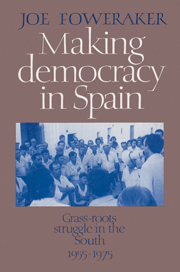Book contents
- Frontmatter
- Contents
- Preface
- Introduction: personal networks, political strategies and the making of democracy
- PART I PERSONAL NETWORKS, POLITICAL TRADITIONS AND STATE POLICIES
- 1 Unquiet hearts: the primitive world of the first political men
- 2 The burden of hopes and hatreds: ideological traditions in clandestine circumstance
- 3 Oligarchic unity and working-class divisions: a political economy of E1 Marco de Jerez
- 4 Political clans and capitalist planning: a political economy of Francoism
- PART II SYNDICAL PRACTICES, SOCIAL STRUGGLES AND POLITICAL PROTESTS
- PART III POLITICAL PRACTICES, REPRESSION AND STRATEGIC RESPONSES
- PART IV POLITICAL STRATEGIES AND THE DEMOCRATIC PROJECT
- Bibliography
- Index
3 - Oligarchic unity and working-class divisions: a political economy of E1 Marco de Jerez
Published online by Cambridge University Press: 29 September 2009
- Frontmatter
- Contents
- Preface
- Introduction: personal networks, political strategies and the making of democracy
- PART I PERSONAL NETWORKS, POLITICAL TRADITIONS AND STATE POLICIES
- 1 Unquiet hearts: the primitive world of the first political men
- 2 The burden of hopes and hatreds: ideological traditions in clandestine circumstance
- 3 Oligarchic unity and working-class divisions: a political economy of E1 Marco de Jerez
- 4 Political clans and capitalist planning: a political economy of Francoism
- PART II SYNDICAL PRACTICES, SOCIAL STRUGGLES AND POLITICAL PROTESTS
- PART III POLITICAL PRACTICES, REPRESSION AND STRATEGIC RESPONSES
- PART IV POLITICAL STRATEGIES AND THE DEMOCRATIC PROJECT
- Bibliography
- Index
Summary
Ay, Jerez! Jerez!… City of millionaires, surrounded by an immense horde of beggars!… The strange thing is that you are still there, so white and pretty, laughing at all the misery, without anyone having set you on fire.
Blasco Ibañez, La BodegaThe restless struggles of these men with unquiet hearts were carried forward in the social and economic context of El Marco de Jerez, where they were constantly rebuffed by a landed oligarchy which sat secure on the rich soils of the vineyards of southern Spain. Indeed, there is probably no more cohesive and tight-knit political clan in the whole of Spain than this sherry oligarchy, which is so closely bound by common economic and political interests, and by common cultural characteristics, that it composes an almost monolithic class fraction which has traditionally exercised its political power with supreme composure and confidence. Moreover, in its unrelenting opposition to the organizations of the working class in the vineyards and the pueblos, it was a quintessential expression of the national financial—landowning oligarchy which proved to be the most enduring base of social support for the Franco regime (as I argue in Chapter 4). So whenever the Communist Party referred (as it so often did) to that ‘monopolistic oligarchy characterized by its integration with the large land-owners’ (e.g., PCE: 1973), it could have been pointing to the particular case of El Marco.
- Type
- Chapter
- Information
- Making Democracy in SpainGrass-Roots Struggle in the South, 1955–1975, pp. 46 - 60Publisher: Cambridge University PressPrint publication year: 1989



